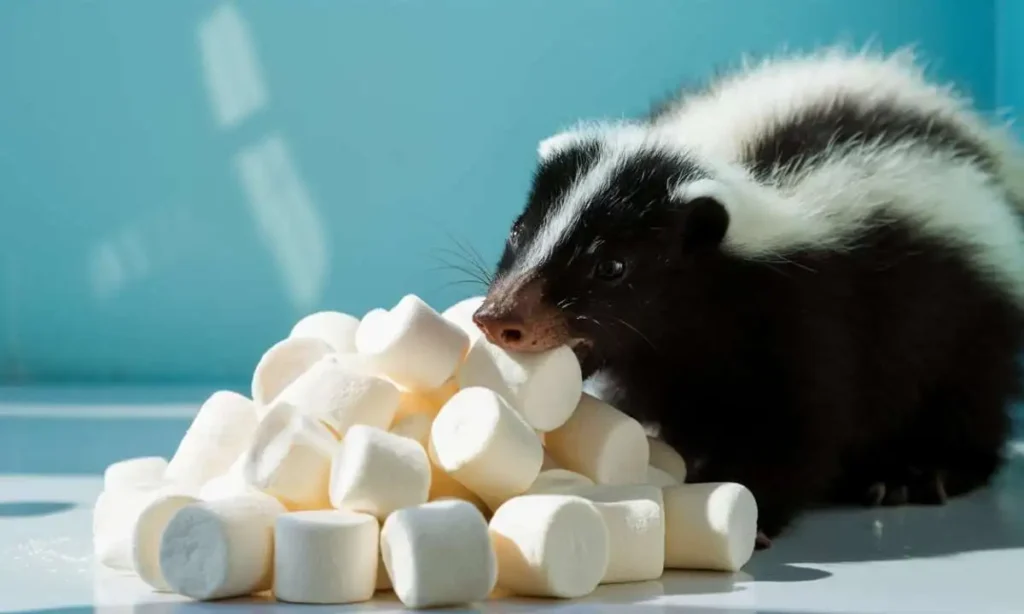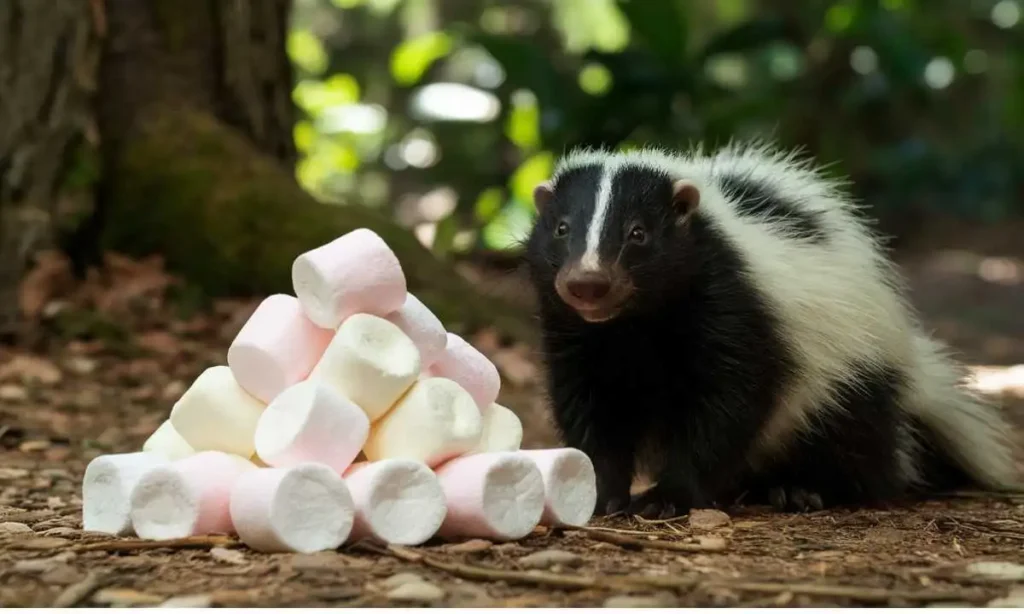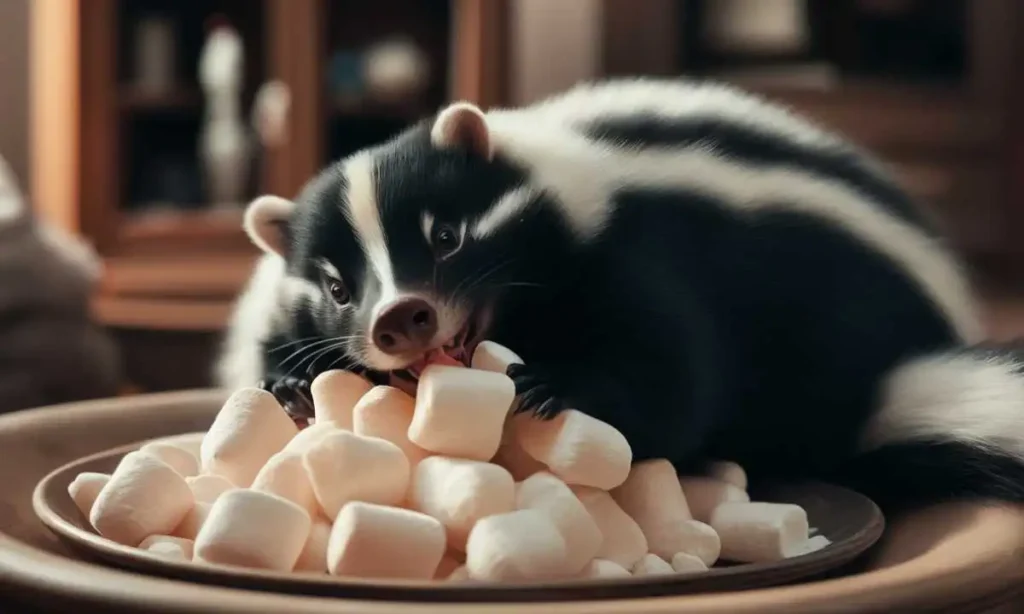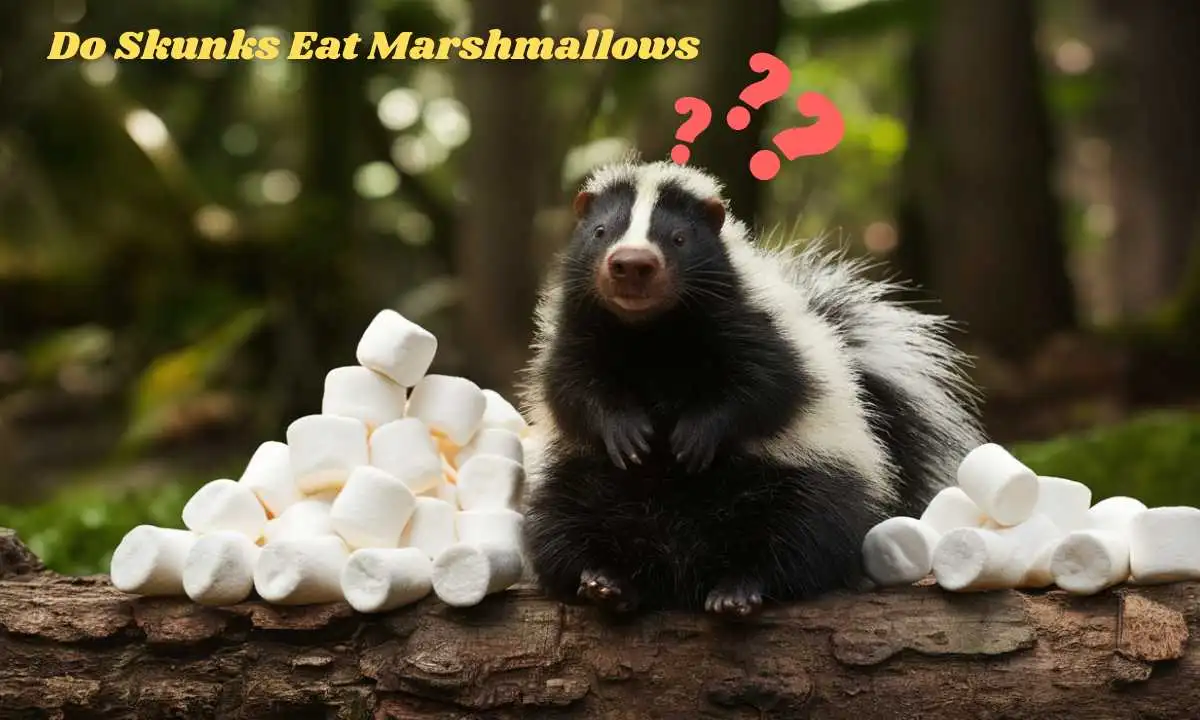Can Skunks Eat Marshmallows? Human Foods for Skunk
Last updated on November 4th, 2024 at 07:06 am
Yes, skunks eat marshmallows! From my research as a skunk pet owner and wildlife lover, I’ve discovered that these animals are quite fond of sweets. Skunks are opportunistic eaters, and marshmallows are a tempting snack for them. If you’re curious about how this affects their behavior and diet, keep reading to discover more.
Marshmallows As Skunk Food
Skunks are known for their unique diet and peculiar eating habits. One question often asked is, “Do skunks eat marshmallows?” Marshmallows, a sweet treat enjoyed by many, might seem like an unusual food choice for skunks. Let’s delve into marshmallows as food to better understand if skunks might find them appealing.

Ingredients
Marshmallows are made from a few key ingredients that give them their fluffy texture and sweet taste. These ingredients include:
- Sugar: The primary ingredient, providing sweetness.
- Gelatin: Gives marshmallows their chewy texture.
- Water: Used to dissolve the sugar and gelatin.
- Corn Syrup: Adds sweetness and helps with the texture.
- Vanilla Extract: Adds flavor.
Sometimes, marshmallows also contain artificial colors and flavors to enhance their appeal. These ingredients make marshmallows a high-sugar treat, which may not be suitable for many animals.
Here’s a simple table summarizing the main ingredients:
| Ingredient | Purpose |
|---|---|
| Sugar | Sweetness |
| Gelatin | Texture |
| Water | Dissolve sugar and gelatin |
| Corn Syrup | Sweetness and texture |
| Vanilla Extract | Flavor |
Nutritional Value
Marshmallows are not known for their nutritional benefits. They are a high-calorie, low-nutrient food. Here’s a breakdown of the typical nutritional content of marshmallows:
- Calories: One regular-sized marshmallow contains approximately 25 calories.
- Sugar: Each marshmallow has around 4 grams of sugar.
- Carbohydrates: A single marshmallow has about 6 grams of carbohydrates.
- Protein: Very low, almost negligible.
- Fat: Marshmallows are fat-free.
Here’s a detailed table showing the nutritional breakdown per marshmallow:
| Nutrient | Amount per Marshmallow |
|---|---|
| Calories | 25 |
| Sugar | 4 grams |
| Carbohydrates | 6 grams |
| Protein | 0 grams |
| Fat | 0 grams |
Marshmallows are not a healthy choice for skunks or any other animals due to their high sugar content and lack of essential nutrients. While skunks might eat marshmallows if offered, it’s not a recommended food for their diet.
Curiosity About Skunks And Marshmallows

Skunks are fascinating creatures known for their distinctive black and white fur and their infamous defense mechanism. But did you ever wonder about their diet? Specifically, do skunks eat marshmallows? This curiosity has sparked many questions among nature enthusiasts and pet owners alike. Let’s explore this intriguing topic.
Many people are curious about the dietary habits of skunks. The question of whether skunks eat marshmallows is particularly interesting. Skunks are omnivores, which means they eat both plants and animals. Their diet mainly consists of insects, small mammals, fruits, and vegetables.
But do they have a sweet tooth? Marshmallows are not a natural part of a skunk’s diet, but they might eat them if given the chance. Skunks have been known to eat sugary foods when they come across them.
Understanding Skunk Diets
Skunks typically forage for food in gardens, trash bins, and fields. They are opportunistic feeders, meaning they eat what is available. Their diet includes insects, grubs, small rodents, fruits, and vegetables. They also consume human food scraps if they find them.
Why Skunks Might Eat Marshmallows
Skunks might eat marshmallows because they are curious animals. Marshmallows are soft and sweet, which could attract a skunk’s attention. In the wild, skunks do not encounter marshmallows, but in urban areas, they might find them in trash bins or during camping trips.
Is It Safe For Skunks To Eat Marshmallows?
While skunks might eat marshmallows, they are not a healthy food choice. Marshmallows contain high levels of sugar, which can harm skunks. Consuming sugary foods can lead to obesity and dental problems in skunks.
| Food | Common in Skunk Diet |
|---|---|
| Insects | Yes |
| Fruits | Yes |
| Vegetables | Yes |
| Marshmallows | No |
Alternatives To Marshmallows For Skunks
If you want to feed a skunk, consider healthier options. Skunks enjoy fruits like apples, berries, and melons. Vegetables such as carrots and peas are also good choices. Always ensure the food is fresh and free from pesticides.
Experiments And Observations
Have you ever wondered if skunks eat marshmallows? Experiments and observations provide fascinating insights into this unusual dietary query. Researchers have conducted various tests to see how skunks react to marshmallows and what impact these sugary treats have on their health.

Skunks’ Reactions To Marshmallows
Scientists and animal enthusiasts have observed skunks’ reactions to marshmallows in controlled settings. Skunks are naturally curious animals, and their responses to unfamiliar foods can be quite telling. Here’s what was found:
- Initial Curiosity: Skunks often sniff and paw at marshmallows, showing initial curiosity.
- Taste Test: Some skunks bite into marshmallows, while others ignore them after the first sniff.
- Continued Interest: If a skunk likes the taste, it may continue to eat the marshmallow.
Researchers have noted varied reactions among different skunks. A small study provided more structured observations:
| Skunk | Reaction |
|---|---|
| Skunk A | Sniffed and ignored |
| Skunk B | Ate half a marshmallow |
| Skunk C | Ate the whole marshmallow |
Skunks’ reactions to marshmallows can vary based on individual preferences. Some skunks may find them appealing, while others might not be interested at all. These observations highlight the unique dietary habits of skunks.
Impact On Skunks’ Health
Feeding marshmallows to skunks raises concerns about their health. Marshmallows are high in sugar and lack nutritional value, which can have adverse effects on skunks.
Key health impacts include:
- Weight Gain: Excessive sugar intake can lead to weight gain in skunks.
- Dental Issues: Sugary treats can cause dental problems, including cavities.
- Nutritional Deficiency: Marshmallows do not provide essential nutrients, leading to deficiencies.
Veterinarians advise against feeding marshmallows to skunks. A balanced diet is crucial for their well-being. A diet rich in proteins, fruits, and vegetables supports their health better.
Here’s a comparison of a healthy diet versus a marshmallow diet for skunks:
| Diet Type | Components | Health Impact |
|---|---|---|
| Healthy Diet | Proteins, Fruits, Vegetables | Positive |
| Marshmallow Diet | Sugar, Empty Calories | Negative |
Ensuring a skunk’s health involves providing a balanced diet and avoiding sugary snacks like marshmallows.
Possible Reasons For Skunks’ Behavior
Skunks are curious creatures known for their distinctive black and white fur and their potent spray. Many people wonder about their eating habits, especially the question: Do skunks eat marshmallows? Skunks might be drawn to marshmallows for several reasons. Let’s explore some possible reasons for this behavior.
Sweet Aroma Attraction
Skunks have a strong sense of smell, which helps them find food. The sweet aroma of marshmallows can attract them. Here are some reasons why skunks might be drawn to the scent:
- Curiosity: Skunks are naturally curious and will investigate new smells.
- Hunger: If a skunk is hungry, it will be more likely to follow a sweet smell.
- Easy Access: Marshmallows are often left out in campsites, making them easy for skunks to find.
Skunks rely on their sense of smell to find food. The strong, sweet scent of marshmallows stands out to them. This is especially true in natural settings where food choices are limited. The sweet aroma makes marshmallows an appealing treat for skunks.
Similarity To Natural Food
Marshmallows might resemble some of the foods skunks find in the wild. Here are some similarities:
| Marshmallows | Natural Food |
|---|---|
| Soft and chewy texture | Insects and grubs |
| Sweet taste | Fruits and berries |
Skunks eat a variety of foods in the wild. The texture of marshmallows can be similar to the insects and grubs they enjoy. The sweetness of marshmallows might remind them of fruits and berries. These similarities make marshmallows a tempting snack for skunks.
- Texture: Marshmallows are soft, like many natural foods skunks eat.
- Sweetness: The sweet taste of marshmallows can attract skunks.
Understanding these similarities can help explain why skunks are drawn to marshmallows. The texture and sweetness make them appealing, resembling some of their natural food sources.
Frequently Asked Questions
Skunks find cat food, peanut butter, and fish irresistible. They also love fruits, insects, and small rodents.
Skunks love eating insects, small rodents, fruits, and vegetables. They also enjoy grubs, berries, and bird eggs. Skunks are omnivores and have a varied diet.
Skunks are attracted to strong smells. They love the scent of garbage, pet food, birdseed, and fallen fruit. Compost piles and grubs also lure them.
Conclusion
Skunks enjoy a varied diet, and marshmallows can be an occasional treat. It’s crucial to feed them sparingly. Overindulgence in sugary foods isn’t healthy for skunks. Understanding their dietary needs ensures their well-being. Always prioritize natural foods for a healthier, happier skunk.

